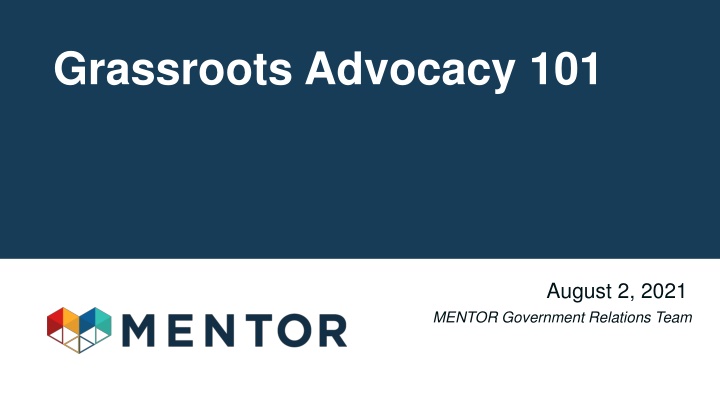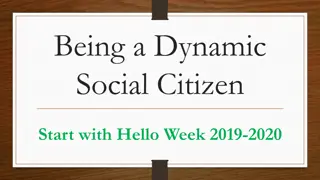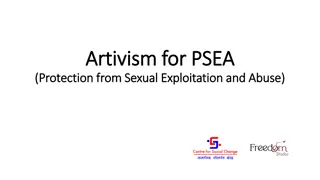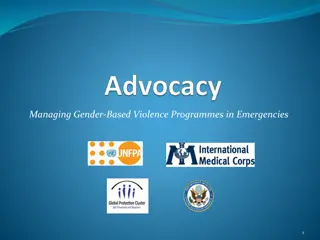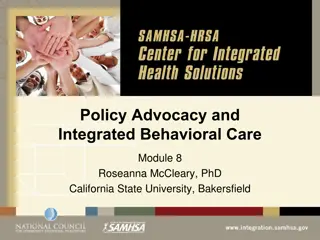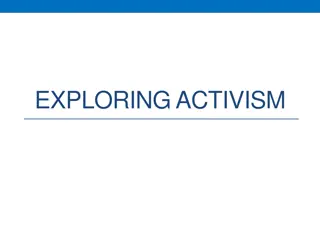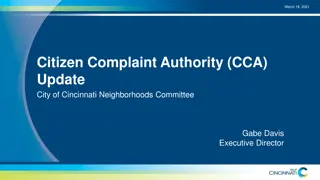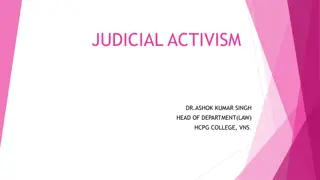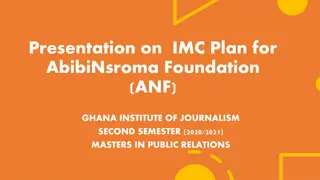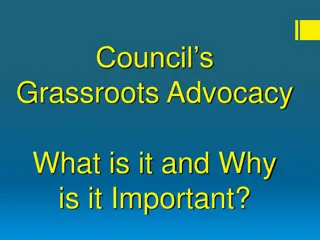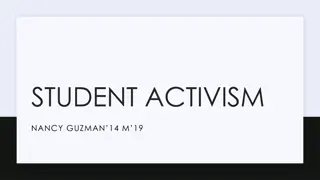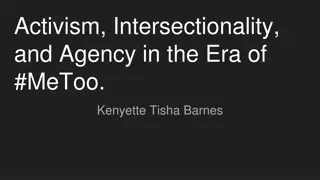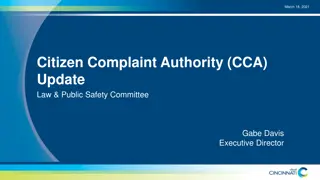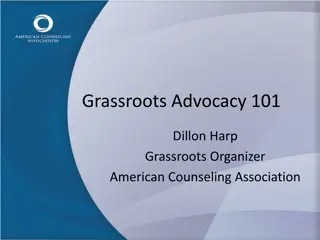Grassroots Advocacy: Empowering Change Through Citizen-Based Activism
Grassroots Advocacy 101 provides insights into the importance of advocacy, various advocacy tactics, and the ways to engage in policy change effectively. It emphasizes the significance of grassroots efforts in influencing policy decisions, engaging with elected officials, and making a meaningful impact on social change.
Download Presentation

Please find below an Image/Link to download the presentation.
The content on the website is provided AS IS for your information and personal use only. It may not be sold, licensed, or shared on other websites without obtaining consent from the author.If you encounter any issues during the download, it is possible that the publisher has removed the file from their server.
You are allowed to download the files provided on this website for personal or commercial use, subject to the condition that they are used lawfully. All files are the property of their respective owners.
The content on the website is provided AS IS for your information and personal use only. It may not be sold, licensed, or shared on other websites without obtaining consent from the author.
E N D
Presentation Transcript
Grassroots Advocacy 101 August 2, 2021 MENTOR Government Relations Team
Agenda Why Advocate? Advocacy Tactics Opportunities to Engage Congressional Staff Q+A 3
Why Advocate? Community and systems-level change requires public policy Policy impacts nonprofits abilities to complete their mission Volunteers want to be engaged in making a meaningful difference Advocacy is how we enact social change. 5
Types of Advocacy Public awareness/education Lobbying Grassroots advocacy/organizing 6
MENTOR National Policy Team Move key legislative priorities by: Direct lobbying of Congress and the Administration Educating state and local affiliates about strategies for direct and grassroots advocacy Supporting state and local affiliates public policy capacity building work Building partnerships and coalitions with national allies 7
Examples of Organizations that do Grassroots Advocacy well? Share in the chat! 8
What is grassroots advocacy? Citizen-based activism. Local value Impact Exposure Engagement 9
Why does grassroots advocacy matter? It is the duty of elected officials to listen to their constituents and address their concerns Powerful motivators: reelection, recognition, and influence Effective grassroots advocacy can wield as much influence as the biggest corporation 10
Grassroots Advocacy Tactics Legislative campaigns Contact your elected officials to advance policy Social media counts as contact! Media lobbying TV, radio, newspapers Social media Mass movements Protests, boycotts, walk-outs Marches 11
Low Engagement Consuming quality media Educate yourself on the issues Following an organization or rep on social media Email lists 13
Medium Engagement Filling out an action alert Calling the offices of your elected officials Write a letter to the editor Using social media to advocate or educate i.e. tagging your elected representatives with an advocacy message; sharing a fact sheet 14
High Engagement Attend a town hall and ask a question Meet with elected officials Site visits Testify before a legislative committee Joining a government task force Leading a protest/volunteer organizing activity 15
Examples of Organizations that do Grassroots Advocacy well? 16
But How?: Opportunities to Engage
Action Alert Tweet at and write to your Members of Congress Letter and tweets are advocating for: Foster Youth Mentoring Act, Youth Workforce Readiness Act, RISE from Trauma Act, Youth Mentoring Caucus How can you support?: participate and share mentoring.org/advocacy-august 18
Mayors for Mentoring Strategy to build relationships with elected local officials MENTOR is encouraging each affiliate and our grassroots network to nominate at least two new Mayors for Mentoring from their state How can you support: Identify mayors and nominate mentoring.org/mayors-for-mentoring 19
Additional Advocacy Resources MENTOR provides a number of resources to help build your skills and get educated Additional grassroots training and topic-specific mentoring.org/resource/advocacy-resources 20
Tips for Giving Public Testimony Who is the best deliverer of the message? Make the policy personal Check ahead of time to understand the public body s rules Keep your message concise (3-5 minutes as a rule of thumb) 21
Tips for Working with Elected Officials What is your ask? They re people too! Do your research Include constituent voice Make it easy for them You don t have to know all the answers Follow up 22
Action Items (do this right now!) Send an action alert (e-mail and tweet) Nominate a Mayor for Mentoring Sign up for your member of Congress newsletter 23
Congressional Staff Q+A Ken Brooke, Legislative Director, Rep. Mark Amodei (R-NV) Faith Wilcox, Legislative Assistant, Rep. Mary Gay Scanlon (D-PA) 24
